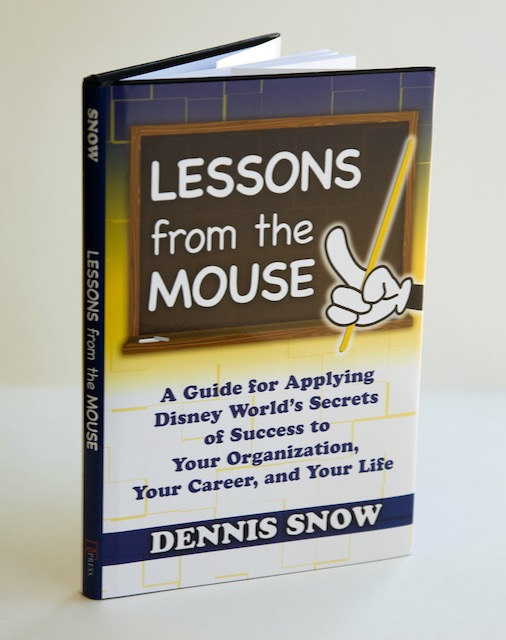Words a Customer Should NEVER Hear
Posted on March 8, 2021 by Dennis Snow
 In my book, Lessons From the Mouse – a Guide For Applying Disney World’s Secrets of Success to Your Organization, Your Career, and Your Life, one of the chapters is titled, “Never Ever Say, ‘That’s Not My Job’ – Don’t Even Think it!” When I reflect on my years working with Disney, I remember how clearly it was communicated that saying anything close to, “That’s not my job,” was just about the quickest way to end your Disney career. As cast members, we were expected to do what it took to get the job done – no excuses or passing the buck. And getting the job done included keeping the place clean. It’s EVERY cast member’s job to pick up trash off the ground regardless of role or title. And what do you think is the number one guest compliment about Disney World? If you guessed how clean the place is, you’re right.
In my book, Lessons From the Mouse – a Guide For Applying Disney World’s Secrets of Success to Your Organization, Your Career, and Your Life, one of the chapters is titled, “Never Ever Say, ‘That’s Not My Job’ – Don’t Even Think it!” When I reflect on my years working with Disney, I remember how clearly it was communicated that saying anything close to, “That’s not my job,” was just about the quickest way to end your Disney career. As cast members, we were expected to do what it took to get the job done – no excuses or passing the buck. And getting the job done included keeping the place clean. It’s EVERY cast member’s job to pick up trash off the ground regardless of role or title. And what do you think is the number one guest compliment about Disney World? If you guessed how clean the place is, you’re right.
But the fact remains that the “That's Not My Job Syndrome” is alive and well in business today. I see it and hear it all the time, and my guess is you probably do too. Sometimes it’s blatant and sometimes it’s subtle, but it’s there. It reveals a lack of care or ownership on the part of the employee and results in frustration on the part of the customer. While the employee might not come right out and say, “That’s not my job,” the sentiment is implied by what they DO say or do.
Here are a few ways in which “That’s Not My Job” rears its ugly head:
- Lack of eye contact – Have you ever been wandering through a store, looking for someone to assist you, and you see an employee quickly walking down the aisle, eyes down, avoiding any kind of eye contact with customers? Sure you have. That employee’s body language is saying, “It’s not my job to help you, I’m too busy.” Sometimes they even pretend not to hear when you say, “Excuse me!” It’s infuriating and it’s a loyalty killer. I’ve had this happen to me in many restaurants as well.
- Passing the buck – After explaining your problem to an employee they say you’ll have to go to XYZ department to get it solved. That employee has just told you that solving your problem is not their job; it’s someone else’s job.
- “I don’t know” – You ask a question and the employee replies with a simple, “I don’t know” without any offer to find out. What that employee just implied was that it’s not his or her job to know the answer to your question, or to find out the answer. At Disney, saying, “I don’t know” without following up with, “but let me find out” was completely unacceptable. It was the cast member’s job to find out.
- The cold transfer – After explaining your question or issue over the phone to an employee, she says, “I’m going to transfer you to the department that handles that.” After being on hold seemingly forever, someone finally answers, “This is John, can I help you?” Leaving you to explain the question or issue all over again. What that first employee was REALLY saying is, “You’re no longer my problem, you’re John’s problem.” In other words, “That’s not my job.”
I’m not implying that every employee is responsible for doing every job. That would not only be impractical, it would be impossible. What I am saying is that it’s every employee’s job to make sure the customer is taken care of. If the employee can’t solve the issue, it should be his or her job to take ownership of the issue until the right person or department takes over, and not abdicate responsibility one second before that happens.
A good way to get this ownership mindset going would be to address it in one of your team meetings. Have your employees brainstorm the many ways the “That’s Not My Job Syndrome” manifests itself. You might want to use one or more of the examples mentioned earlier to prime the pump. Once you have a good list, then have employees brainstorm actions or words that would communicate ownership of the issue to the customer. Maybe even role-play different scenarios to make sure everyone has it down.
I can always tell when I’m dealing with an employee who takes ownership of a situation. There’s a confidence in their approach that generates trust that my issue will be handled with little or no hassle. And that’s a loyalty builder.
So here’s something to think about: How does the “That's Not My Job Syndrome” manifest itself in your organization, and what can you do about it?